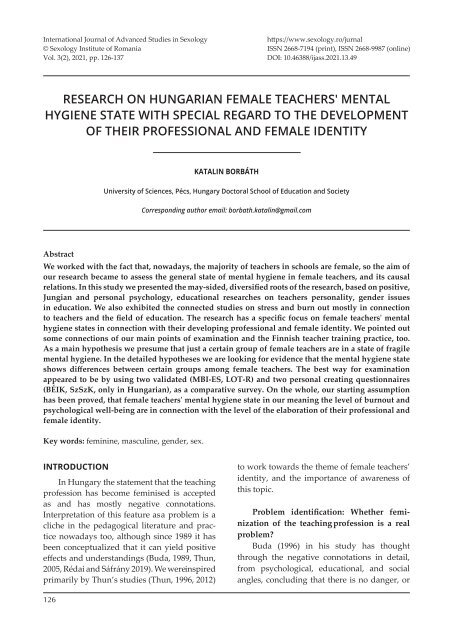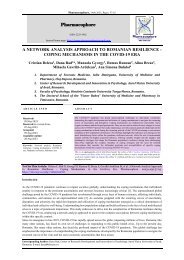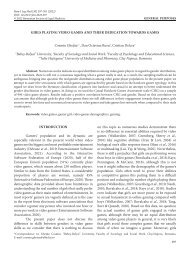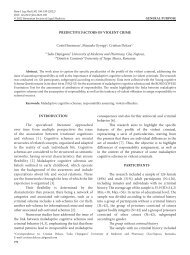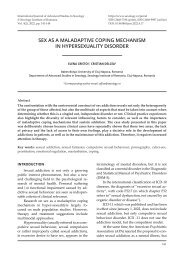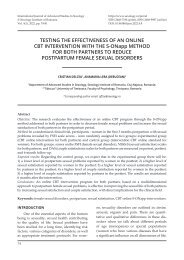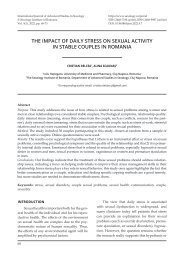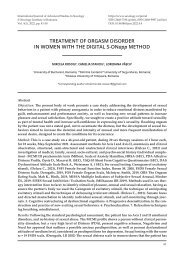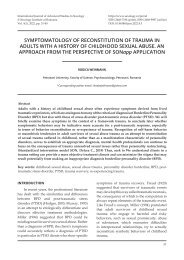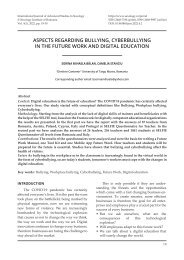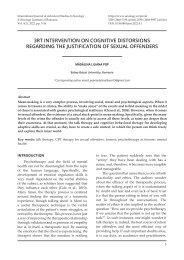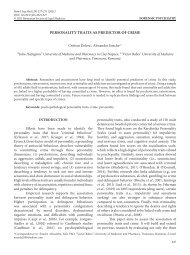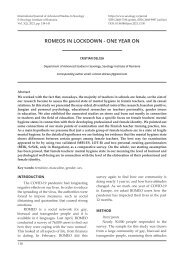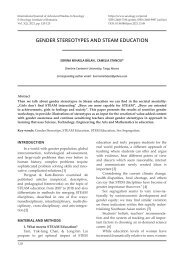RESEARCH ON HUNGARIAN FEMALE TEACHERS' MENTAL HYGIENE STATE WITH SPECIAL REGARD TO THE DEVELOPMENT OF THEIR PROFESSIONAL AND FEMALE IDENTITY
We worked with the fact that, nowadays, the majority of teachers in schools are female, so the aim of our research became to assess the general state of mental hygiene in female teachers, and its causal relations. In this study we presented the may-sided, diversified roots of the research, based on positive, Jungian and personal psychology, educational researches on teachers personality, gender issues in education. We also exhibited the connected studies on stress and burn out mostly in connection to teachers and the field of education. The research has a specific focus on female teachers' mental hygiene states in connection with their developing professional and female identity. We pointed out some connections of our main points of examination and the Finnish teacher training practice, too. As a main hypothesis we presume that just a certain group of female teachers are in a state of fragile mental hygiene. In the detailed hypotheses we are looking for evidence that the mental hygiene state shows differences between certain groups among female teachers. The best way for examination appeared to be by using two validated (MBI-ES, LOT-R) and two personal creating questionnaires (BÉIK, SzSzK, only in Hungarian), as a comparative survey. On the whole, our starting assumption has been proved, that female teachers' mental hygiene state in our meaning the level of burnout and psychological well-being are in connection with the level of the elaboration of their professional and female identity.
We worked with the fact that, nowadays, the majority of teachers in schools are female, so the aim of our research became to assess the general state of mental hygiene in female teachers, and its causal relations. In this study we presented the may-sided, diversified roots of the research, based on positive, Jungian and personal psychology, educational researches on teachers personality, gender issues in education. We also exhibited the connected studies on stress and burn out mostly in connection to teachers and the field of education. The research has a specific focus on female teachers' mental hygiene states in connection with their developing professional and female identity. We pointed out some connections of our main points of examination and the Finnish teacher training practice, too. As a main hypothesis we presume that just a certain group of female teachers are in a state of fragile mental hygiene. In the detailed hypotheses we are looking for evidence that the mental hygiene state shows differences between certain groups among female teachers. The best way for examination appeared to be by using two validated (MBI-ES, LOT-R) and two personal creating questionnaires (BÉIK, SzSzK, only in Hungarian), as a comparative survey. On the whole, our starting assumption has been proved, that female teachers' mental hygiene state in our meaning the level of burnout and psychological well-being are in connection with the level of the elaboration of their professional and female identity.
You also want an ePaper? Increase the reach of your titles
YUMPU automatically turns print PDFs into web optimized ePapers that Google loves.
International Journal of Advanced Studies in Sexology<br />
© Sexology Institute of Romania<br />
Vol. 3(2), 2021, pp. 126-137<br />
https://www.sexology.ro/jurnal<br />
ISSN 2668-7194 (print), ISSN 2668-9987 (online)<br />
DOI: 10.46388/ijass.2021.13.49<br />
<strong>RESEARCH</strong> <strong>ON</strong> <strong>HUNGARIAN</strong> <strong>FEMALE</strong> <strong>TEACHERS'</strong> <strong>MENTAL</strong><br />
<strong>HYGIENE</strong> <strong>STATE</strong> <strong>WITH</strong> <strong>SPECIAL</strong> <strong>REGARD</strong> <strong>TO</strong> <strong>THE</strong> <strong>DEVELOPMENT</strong><br />
<strong>OF</strong> <strong>THE</strong>IR PR<strong>OF</strong>ESSI<strong>ON</strong>AL <strong>AND</strong> <strong>FEMALE</strong> <strong>IDENTITY</strong><br />
KATALIN BORBÁTH<br />
University of Sciences, Pécs, Hungary Doctoral School of Education and Society<br />
Corresponding author email: borbath.katalin@gmail.com<br />
Abstract<br />
We worked with the fact that, nowadays, the majority of teachers in schools are female, so the aim of<br />
our research became to assess the general state of mental hygiene in female teachers, and its causal<br />
relations. In this study we presented the may-sided, diversified roots of the research, based on positive,<br />
Jungian and personal psychology, educational researches on teachers personality, gender issues<br />
in education. We also exhibited the connected studies on stress and burn out mostly in connection<br />
to teachers and the field of education. The research has a specific focus on female teachers' mental<br />
hygiene states in connection with their developing professional and female identity. We pointed out<br />
some connections of our main points of examination and the Finnish teacher training practice, too.<br />
As a main hypothesis we presume that just a certain group of female teachers are in a state of fragile<br />
mental hygiene. In the detailed hypotheses we are looking for evidence that the mental hygiene state<br />
shows differences between certain groups among female teachers. The best way for examination<br />
appeared to be by using two validated (MBI-ES, LOT-R) and two personal creating questionnaires<br />
(BÉIK, SzSzK, only in Hungarian), as a comparative survey. On the whole, our starting assumption<br />
has been proved, that female teachers' mental hygiene state in our meaning the level of burnout and<br />
psychological well-being are in connection with the level of the elaboration of their professional and<br />
female identity.<br />
Key words: feminine, masculine, gender, sex.<br />
INTRODUCTI<strong>ON</strong><br />
In Hungary the statement that the teaching<br />
profession has become feminised is accepted<br />
as and has mostly negative connotations.<br />
Interpretation of this feature as a problem is a<br />
cliche in the pedagogical literature and practice<br />
nowadays too, although since 1989 it has<br />
been conceptualized that it can yield positive<br />
effects and understandings (Buda, 1989, Thun,<br />
2005, Rédai and Sáfrány 2019). We were inspired<br />
primarily by Thun’s studies (Thun, 1996, 2012)<br />
to work towards the theme of female teachers’<br />
identity, and the importance of awareness of<br />
this topic.<br />
Problem identification: Whether feminization<br />
of the teaching profession is a real<br />
problem?<br />
Buda (1996) in his study has thought<br />
through the negative connotations in detail,<br />
from psychological, educational, and social<br />
angles, concluding that there is no danger, or<br />
126
Research on Hungarian Female Teachers' Mental Hygiene State With Special Regard<br />
that the feminization of the teaching profession<br />
may not have any significant impact.<br />
At the same time, Buda says that women, by<br />
nature, are more sensitive and more capable<br />
of empathy than men. In our opinion, the<br />
explanation of these features has nothing to do<br />
with the temperament of the female, hence, in<br />
the field of pedagogy, which is dominated by<br />
women, could we notice empathetic expressions,<br />
or expressions without empathy.<br />
The question arises whether gender itself<br />
predisposes an individual toward certain operational<br />
behaviour patterns, or toward a state<br />
of mental hygiene, or whether personal disposition<br />
makes a difference? The latter arises in<br />
studies by Zsuzsa F.Lassú (F. Lassú, 2001,<br />
2004).<br />
One question remains: whether the<br />
plurality of the female personality plays a role?<br />
How much are women aware of their personality,<br />
how authentically do they live? Do they<br />
simply adjust their personality to the expectations<br />
of society (Kovács E., 2012)? How aware<br />
are female teachers of other questions relating<br />
to their profession? Does the measurement of<br />
awareness make any difference in the mental<br />
hygiene state, or to the extent of burnout?<br />
In what circumstances could they sustain a<br />
healthy personality?<br />
Another issue further complicates the<br />
matter: how the state of teachers is influenced<br />
by the way the topic of gender is handled in<br />
schools, and the almost complete invisibility of<br />
the topic in everyday life.<br />
The awareness is also a question according<br />
to how developed the professional personality<br />
is.<br />
Whether an individual who is aware of her<br />
place and has built her professional personality<br />
is less vulnerable according to the controversial<br />
expectations upon women (like a teacher<br />
and like a female)? Does an individual who is<br />
more aware choose her operational skills and<br />
reactions, does she feel her identity as a whole,<br />
and experience greater protection in her state<br />
of mental hygiene? It has become clear that<br />
this awareness when developing female and<br />
professional identity is a basic point in our<br />
examination.<br />
Another important point of view for us is<br />
that we intended to examine the female teacher’s<br />
mental hygiene state, not just merely from<br />
the deficiency side, but from the resource’s side<br />
also. For this reason, the approach of positive<br />
psychology found a place in the research and<br />
the interpretation.<br />
From this aspect, we do not focus on deficit,<br />
but psychological well-being and its elements.<br />
Aims of the research assess the state of<br />
mental hygiene in female teachers<br />
We worked with the fact that, nowadays,<br />
the majority of teachers in schools are female,<br />
so the aim of the research became to assess<br />
the general state of mental hygiene in female<br />
teachers, and its causal relations. The long-term<br />
aims of the research are to contribute to the<br />
creation of a state of well-being with relation<br />
to teacher’s mental hygiene; and through their<br />
state of well-being, thrive in a school climate,<br />
and indirectly help to create a less stressful,<br />
healthier climate for the students.<br />
Another aim of our research is to refute<br />
those theoretical pathways and practical<br />
misbeliefs which surround the concept of the<br />
feminization of the teaching profession.<br />
The research has a specific focus on female<br />
teachers’ mental hygiene states in connection<br />
with their developing professional and female<br />
identity, so to provide a many-sided view<br />
which allows us to be aware of certain nuances.<br />
Our research examines personal and<br />
professional identity, focusing on active female<br />
teachers’ mental hygiene state, and searches<br />
for relationships between presence of personal<br />
and professional identity, their level of elaboration,<br />
and the state of mental hygiene. It is<br />
important to point out, taht the survey of the<br />
mental hygiene state came from two directions.<br />
From burnout, and from the shape of personal<br />
life orientation as a predictor of psychological<br />
well-being.<br />
The dissertation represents psycho-dynamical<br />
theoretical aspects of the personality,<br />
which has roots in the possibility of continuous<br />
development, and it seeks to identify the presence<br />
of the conscious shaping of it with the<br />
complex examination of the female teachers’<br />
mental hygiene state.<br />
127
KATALIN BORBÁTH<br />
The most appropriate definition of the<br />
dynamic personality concept approach is the<br />
integrated, three-leveled model of McAdams<br />
(1995), which attempts to summarize all the<br />
personality concepts of the different psychological<br />
directions. In his model, he endeavours<br />
to sum up the personality models: and writes<br />
that, on one level, we have found basic personality<br />
traits; on another level there are personality<br />
concepts (attitude, motifs, beliefs, roles,<br />
etc.) which depend on social environment. He<br />
assumes the existence of a third level of the<br />
personality also, which contains identities<br />
and narratives of the personality which can be<br />
organized into a narrative identity.<br />
Parallel thoughts with Finish teacher<br />
training practice<br />
The actuality of the researched theme<br />
has been shown by its topic. It deals with the<br />
educational field, which is always affected by<br />
contemporary issues. Including the topic of the<br />
educational field, the research concentrates on<br />
the actors in the process, those who determine<br />
the quality of the education: the teachers. In<br />
this way, it is connected to the field of teachers’<br />
personality research, which is nowadays<br />
undergoing something of a renaissance (Göncz,<br />
2014, 2017). Since the research (which sprang<br />
from the fact that the majority of teachers are<br />
women) has focused on female teachers, it finds<br />
a connection with surveys on gender in school,<br />
including teachers functioning, methods, and<br />
effects of teaching (Kovács, E., 2019). The novel<br />
start point of the research is the examination of<br />
the female teacher’s mental hygiene state from<br />
multi-angled ways integrated to the objects of<br />
the research, the questions of professional<br />
identity and psychological well-being. At this<br />
point, we would like to open the readers’ eyes<br />
to the fact that Finnish education, which is one<br />
of the most modern, up-to-date educational<br />
models, places a huge emphasis on the creation<br />
of professional identity. It is easy to find<br />
connections between the features of the system<br />
and the atmosphere in Finnish schools and<br />
the teacher training model. It is not the aim of<br />
this dissertation to explain the Finnish teacher<br />
training system, but we would like to make use<br />
of those connections which relate to teachers’<br />
personality, identity, and professional identity.<br />
To begin with, it should be mentioned that<br />
support of teachers’ professional identity plays<br />
a central role in the model. This importance<br />
of this central role has been intensified by the<br />
relationship between surveys and teaching,<br />
which makes the professional self and identity<br />
stronger during the years spent studying<br />
at university. Orsolya Kálmán says that there<br />
aren’t special Finnish methodologies; the<br />
essence is in the interplay of the educational<br />
effect systems (Kálmán, 2008, 3.). The Finnish<br />
teacher training system pays extra attention<br />
to shaping the teachers’ own identity; as they<br />
urge the creation of a personal teacher’s image<br />
(Kálmán, 2008). An important element of the<br />
Finnish teacher training system is the preparation<br />
of teacher candidates for continuous<br />
self-reflection and the development of critical<br />
thinking elements of which play a part in the<br />
creation of professional identity also (Csapó,<br />
2015). Through the influence of the Finnish<br />
teacher training model, the educational system<br />
has started to change in some European countries,<br />
and more and more countries emphasize<br />
research-based learning. Hungary has also<br />
started the promotion of research-based education.<br />
One sign of this process is that the highest<br />
qualification of the teachers’ professional<br />
pathway goes to teachers who do surveys<br />
(Csapó, 2015).<br />
The Finnish teacher training system<br />
supports candidates to form their own frames of<br />
methodology, theory, and thinking (Kálmán,<br />
2008). In teacher training for candidates or<br />
active teachers equally, professional development<br />
is connected to their personal and<br />
academic way of learning. The integration<br />
of the contents of teacher training provides<br />
research-based teacher training and narrative<br />
biography- based, self-reflective thesis, and<br />
portfolio writing practice(Kálmán, 2011).<br />
Criteria which characterize the emotional<br />
life and the everyday atmosphere of Finnish<br />
schools (natural lifestyle, calm and balanced<br />
teachers and students, well- organized systems,<br />
trust and independence for children, an efficient<br />
system, and the openness of the learning<br />
128
Research on Hungarian Female Teachers' Mental Hygiene State With Special Regard<br />
environment) all assume the presence of<br />
psychological well-being and teachers’ attention<br />
to it (Kálmán, 2008). The system probably<br />
helps the well-being of the candidates, while<br />
diminishing their level of anxiety with not<br />
giving marks also. The few administration tasks<br />
support teachers’ renewing and psychological<br />
well-being too. Also, the Finnish teachers are<br />
valued socially and financially as well.<br />
It is a relevant feature of the Finnish<br />
teacher training system that candidates do<br />
not simply become familiar with the teaching<br />
profession, but their personalities are changed<br />
by the process. These changes are connected to<br />
the structure of the training system which is<br />
based on self-knowledge, research, and active<br />
learning (Hercz, 2008).<br />
Namely, we can state that the features of a<br />
successfully operating teacher training system<br />
are the researched-based aspects, the acquisition<br />
of self-knowledge, and also skills of<br />
self-reflection and building a personal professional<br />
identity, which is based on the previous.<br />
By these criteria, the Finnish system creates<br />
a huge amount of awareness in teachers(candidates)<br />
which is an essential component of the<br />
professional personality of the teachers that we<br />
are examining.<br />
Diversified literature roots of the research<br />
At the background of the research we deal<br />
with most of the main elements (except for<br />
basic skills and capability) of the surveys of the<br />
teachers (traits of an effective teacher; pedagogical<br />
skills; basic personality traits; detecting<br />
the basic skills; knowledge influencing effectiveness;<br />
practical skills; pedagogical thinking;<br />
detecting traits and specialties of pedagogical<br />
decision making; detecting beliefs and practical<br />
philosophy of teachers; defining reflective<br />
teaching; Falus, 1998). We deal with the traits of<br />
effective teachers (as we meant it: they occupy<br />
a state of psychological well-being) (Szebedy,<br />
2005), the basic traits of a teacher (Göncz,<br />
2017), pedagogical thinking; decision-making;<br />
detecting believes; practical philosophy; and<br />
capability of reflection of teachers.<br />
The McKinsley report (2007) gave a new<br />
dynamism of the research approaching the<br />
personality of the teachers by stating that the<br />
most important part of the pedagogical work is<br />
the personality of the teacher.<br />
The cognitive pedagogical direction,<br />
namely the reflective teaching theme has got an<br />
emphasis in the dissertation mostly building<br />
upon the works of Szivák (2010). Before we talk<br />
about the teacher personality surveys- which<br />
touch the territory of personal psychology- we<br />
draw up multivarious personality concepts<br />
(McCrae and Costa, 1987, McAddams,1995).<br />
Identity presents as a common theme of<br />
social psychology and personality psychology<br />
is (Erikson, 1963). The theme of narrative<br />
identity fits in this row (László,2008), as does<br />
the concept of teacher’s professional identity<br />
(Korthagen, 2004). Newsy topics among<br />
themes of teachers’ professional identity is<br />
the balance of work-private life, or private<br />
life-work conflicts topics, which coloured our<br />
work also. On the psychological side we deal<br />
with mostly Jungian personality theories(Jung,<br />
1934/1954 ). Among these theories, we mention<br />
the psychological types theory, including the<br />
extraversion-introversion dimension concept<br />
(Eysenck, 1978, Hull, 2011) and the Jungian<br />
feminist psychoanalytic studies. We gave<br />
extra attention to Jean Shinoda Bolen (Bolen,<br />
1984/2009) Jungian psychoanalyst archetypes<br />
categories and preludes of this. We show some<br />
thoughts from feminist pedagogy literature<br />
which focuses on female teachers and from<br />
feminist psychoanalytic literature with a<br />
focus on the female psyche. The critical analysis<br />
of the feminist psychoanalytic direction<br />
and its thoughts on Bolen’s typology is also<br />
demonstrated. Furthermore, it has shown the<br />
founding of the place of female psychoanalysis<br />
among counseling as an applied science by<br />
also Enns’s studies which we mention shortly<br />
(Enns 1993,1994).<br />
The fertilization of the basics of positive<br />
psychology and some aspects of school<br />
psychology plays a part in theoretical and<br />
practical education, which are both fundamental<br />
basements for the dissertation. Positive<br />
psychology examines the state of the psyche<br />
from the perspective of health (Peterson and<br />
co, 2000, Csíkszentmihályi, 1997/2001, Oláh<br />
129
KATALIN BORBÁTH<br />
2005), which creates a balance according to the<br />
theories that come from the deficit states.<br />
Piko’s (2010) ideas also gave inspiration to<br />
the planning of the research since the theories<br />
and practice of non-traditional mental hygienical<br />
supporting factors are important parts of<br />
the scientific background of our survey. The<br />
most significant positive psychological based<br />
researches and theories on the teacher’s traits<br />
and the field of education are mentioned also<br />
(Holecz és Molnár, 2014, Kun-Szabó, 2017).<br />
The background literature of the survey<br />
has some roots in gender studies as well. They<br />
mostly come from the educational sociology<br />
aspect, since important bases of the research<br />
are the studies which pioneer the examination<br />
of female teachers’ identity (Thun, 1996, F.<br />
Lassú, 2001, Kereszthy, 2005).<br />
Building upon these, the background literature<br />
touches on studies from mental hygiene<br />
as a boundary scientific area, which regards<br />
the development of burnout examination as<br />
the most important thematic element. We can<br />
follow the burnout topic through Maslach and<br />
her colleagues’ examinations (Maslach 1981,<br />
Leiter és Maslach, 2016). Applied psycholo -<br />
gical research on teachers’ mental hygiene are<br />
organic parts of the dissertation too. It worth<br />
mentioning among the Hungarian researchers<br />
Petróczy and her colleagues (1999), Ónody<br />
(2001) Paksi and her colleagues (2006, 2015),<br />
and from the international literature Seibt,<br />
Spitzer, Druschke, Scheuch és Hinz, (2013),<br />
Antalka (2015) examinations.<br />
Next to all of these theoretical strata, we can<br />
regard school psychological attitude (Borbáth,<br />
2010) and institutional mental hygiene examinations<br />
(Szabó-Jagodics, 2016) as antecedents.<br />
Hypotheses<br />
We presume that just a certain group of<br />
female teachers are in a state of fragile mental<br />
hygiene. And this feature refers to the fact that<br />
it is not a consequence of the feminization of<br />
the teaching profession. The detailed hypotheses<br />
control this assumption, where we are<br />
looking for evidence that the mental hygiene<br />
state shows differences between certain<br />
groups among female teachers. In this survey,<br />
we measure mental hygiene by the burnout<br />
state and the attitude of life orientation. More<br />
differentiation research is made possible by the<br />
four-aspect examination. As we examine the<br />
problem, we set one fundamental (H 0.) and five<br />
main hypotheses, next to them we composed<br />
some more hypothetical sub statements also.<br />
We are convinced that with proving or<br />
disclaiming hypotheses shown hereafter, we<br />
can draw a complex picture about female<br />
teachers’ state of professional identity, the<br />
elaboration of their professional identity, and<br />
features of their female identity.<br />
Our start point is H.0. We assume fundamentally<br />
that the state of female teachers’<br />
professional identity, the elaboration of their<br />
professional identity, and features of their<br />
female identity are in connection with their<br />
mental hygiene state. Examining our start point<br />
we established some more hypotheses:<br />
H.1. We presume that female teachers’<br />
mental hygiene state is in connection with<br />
their life orientation. We assume that the more<br />
optimistic life orientation comes along with the<br />
healthier mental hygiene state.<br />
H 2. Female teachers’ mental hygiene<br />
states are different according to their place of<br />
living, / position/ spending years in the teacher<br />
profession/ professional field/ qualification.<br />
H 3. We assume also that female teachers<br />
with variant archetypal characterization have<br />
different mental hygiene states, life orientation,<br />
and professional identity traits.<br />
H 4. Female teachers’ professional identities<br />
are different according to their place of<br />
living, / position/ years spent in the teacher<br />
profession/ professional field/ qualification.<br />
H.5. We presume that the female teachers’<br />
mental hygiene state and life orientation are<br />
in connection with their professional identity<br />
state.<br />
Paradigm and the Framework of the<br />
Research<br />
The chosen research paradigm is a quantitative<br />
one, based on facts, which comes from<br />
systematic measurement and quantifiable<br />
data. The research itself is based on inductive,<br />
conclusion-searching, partly describing<br />
130
Research on Hungarian Female Teachers' Mental Hygiene State With Special Regard<br />
strategy, which gets its starting point from the<br />
everyday reality of school life. Using questionnaires<br />
emerged as an adequate methodology of<br />
the research which in the meantime gave us the<br />
opportunity for an integrative approach also.<br />
The present survey has planned to examine the<br />
transformation of female teachers’ identity and<br />
mental hygiene state. The most expedient way<br />
of planning this examination appeared to be by<br />
using two validated and two personal creating<br />
questionnaires, as a comparative survey.<br />
We have connected the main two questions<br />
of the teachers’ personality research,<br />
while we integrated the question: “what makes<br />
a good teacher?” into the question: “how does<br />
the process of becoming a teacher work?” We<br />
broadened this direction with the aspects of<br />
mental hygiene and, because in the teaching<br />
profession we find mostly women, so we should<br />
examine the role of their female identity elaboration<br />
too.<br />
For the examination, we have done the<br />
four questionnaires of statistical analysis which<br />
together make up a complex whole, since all<br />
of them have grabbed a part of the personality<br />
and the psychological state relevant aspects,<br />
like mental hygiene state, life orientation, the<br />
feature of professional personality and archetypes<br />
of female identity. For mapping the<br />
mental hygiene state, we used to measure<br />
burnout in the validated and broadly applied<br />
Maslach Burnout Inventory Educators Survey<br />
(Schwab, Maslach, Jackson, 1986).<br />
For measuring life orientation, we used the<br />
also validated LOT-R test, which is a tool developed<br />
by representatives of positive psychology<br />
(Scheier, Carver és Bridges,1994).<br />
To make up an image of professional<br />
identity we used an originally developed tool,<br />
called My Professional Identity Questionnaire<br />
(SzSzK). To measure female identity type, we<br />
created another tool, called Female Master<br />
Teachers and Goddess Within Us (BÉIK).<br />
The statistical analysis of the data we have<br />
done by the SPSS statistical program: First we<br />
completed the basics, describing data analysis,<br />
and after the normality examination we<br />
chose the Kruskal-Wallis test for group analysis.<br />
We managed post hoc pair comparisons,<br />
Chi-square tests, and cross tables. Furthermore,<br />
we completed correlation counting’s also. The<br />
coefficients which cause limitations in statistical<br />
analysis are demonstrated also.<br />
Summary of Results and Conclusions<br />
After finishing our examination and its<br />
statistical analysis we can state that our starting<br />
assumptions are proved, that the female<br />
teachers’ mental hygiene state (by our definition<br />
it is the togetherness of the level of burnout and<br />
psychological well- being) are connected with<br />
the extent of elaboration of the professional<br />
identity and the female identity.<br />
Our fundamental hypothesis, -that if<br />
the feminization of the teaching profession<br />
is a problem, then its cause is the missing of<br />
freely and authentically lived professional<br />
and female identity- has been proved. We<br />
can conclude that for the mental health of the<br />
female teachers, they should develop their<br />
professional identity in order to strengthen<br />
their identity and deploy their special female<br />
identity or character combination.<br />
Based on our survey which has formed<br />
the picture in the examined connection more<br />
complex- we can state that it does not come<br />
through in the pedagogical discourse ((Buda,<br />
1996) spread assumption that boys in the feminized<br />
school environment ab ovo have suffered<br />
in their psychosocial development because of<br />
the lack of the male model in teachers’ role.<br />
We can state that our results according to<br />
burnout and life orientation are in harmony<br />
with the current results of national and international<br />
surveys. After the statistical analysis, it<br />
became obvious that our detailed presumptions<br />
were proven, with some exceptions.<br />
It has completely been proven that the<br />
predisposition for optimism and positive life/<br />
orientation is controversially proportional to<br />
signs of burnout. We have found cooperation<br />
by spending years in the teaching profession<br />
and professional field, but we haven’t picked<br />
it up with qualification and position. We have<br />
got indirect affirmation to that fact by choosing<br />
from the archetypes that there are differences in<br />
the mental hygiene state of teachers who live in<br />
Budapest or live in the countryside.<br />
131
KATALIN BORBÁTH<br />
We have significant discrepancies in mental<br />
hygiene state among the different age groups by<br />
spending years in the teaching profession.<br />
We pointed out that in the beginner (0-5<br />
yrs) group of the female teachers are the most<br />
optimistic group, and the female teachers<br />
in the advanced (6-17 yrs) group have the<br />
weakest mental hygiene state. There are<br />
distinctions according to professional fields<br />
also: female teachers in preschools are in the<br />
best mental hygiene state and the ones who<br />
did not indicate professional field are in the<br />
worst mental hygiene state. This outcome was<br />
reinforced by the fact that preschool teachers<br />
tended to choose the mental hygienically<br />
balanced Aphrodite archetype as their type<br />
more than another type. On the contrary, the<br />
teachers who did not indicate professional field<br />
tended to elect a Persephone type, the archetype<br />
famous for fragile psychological well-being.<br />
In the case of the latter group, we assume<br />
identity problems in the background, which<br />
is connected with the character description of<br />
the Persephone type, who are challenged with<br />
difficult identity building. She could transform<br />
by following her inner development from<br />
an unnamed girl into a wise, experienced<br />
woman. In our survey, this transformation was<br />
successful for just a few of them.<br />
Among groups by spending years in the<br />
teaching profession, we have found beginners<br />
are in a more balanced mental hygiene state<br />
than the other groups. In the background of<br />
this balanced state, we detected several special<br />
attitudes and features. One of the beginners’<br />
groups’ strengths is that they do more sport,<br />
more open learning from the experienced<br />
generation, and self-reflection is important for<br />
them.<br />
It is important to consider that beginners<br />
are less receptive to reality than the other<br />
group, which comes across as a mental hygiene<br />
protecting factor. There is another element for<br />
growing self-efficiency for the beginners: they<br />
have a higher level of digital skills than the<br />
other groups (Gyarmathy, 2012), and this fact<br />
can grow their self-confidence and counterbalance<br />
their anxiety comes from the inexperience<br />
which is another broad scientific theme<br />
(Szivák, 1999).<br />
Some of the outcomes of the research<br />
underline the role of the flow experience- as<br />
a central factor- in preserving good mental<br />
hygiene and building professional personality<br />
as more time is spent in the teaching profession.<br />
These outcomes are the facts, that with<br />
the growing years in the teaching profession<br />
the capability for flow strengthens, and which<br />
are parallel with the growing competency and<br />
stronger professional identity.<br />
The beginners’ flow experiences during<br />
classes are the rarest but they are a mentally<br />
healthier group among teachers, which seems<br />
like a contradiction. But, if we thought about<br />
that beginners’ mental hygiene preventive<br />
habits and competencies are stronger on the<br />
whole, that many of capabilities for good<br />
mental hygiene -such as flow, and the more<br />
developed professional personality- of the<br />
groups of veteran teachers and those who have<br />
taught from a long time, we would be disappointed,<br />
because the whole picture is even<br />
more complex than this.<br />
Since the elaboration of the professional<br />
personality and its elements such as the flow<br />
capability at the class is a good prediction of<br />
the stronger psychological well- being. Also,<br />
because the mental hygiene state of the<br />
groups of veteran teachers and the ones who<br />
have taught for a long time is clearer than the<br />
advanced group’s (who have spent less time in<br />
the teaching profession) mental hygiene state.<br />
The research reveals that the advanced<br />
group’s members are in the weakest mental<br />
hygiene state among the groups, according to<br />
the comparison of the amount of time spent in<br />
the teaching profession.<br />
We presume that the effects of the work-life<br />
balance crisis are the strongest in this group,<br />
and because of that external pressure which<br />
becomes internal, the„internal whacker” effect<br />
is the strongest here (Kast, 2012). Furthermore,<br />
the optimism of the beginners does not shield<br />
them at this stage anymore. This group recognised<br />
the anomaly of the educational field<br />
already.<br />
In addition to this for the workload, the<br />
advanced group has the least of all possibilities<br />
for recreational activities. For example,<br />
the number of those who take part in sporting<br />
132
Research on Hungarian Female Teachers' Mental Hygiene State With Special Regard<br />
activities drastically decreased compared to<br />
the previous group. It is an additional specialty<br />
that beginners are not represented in the burnouts’<br />
group nor the group of female teachers in<br />
burnout danger.<br />
In parallel with this we can say that<br />
compared to the other groups, teachers dealing<br />
with children with special needs mental<br />
hygiene are healthier. Alike then kindergarten/preschool/<br />
teachers: among them there<br />
are none in the burnout group, neither in the<br />
group of female teachers in burnout danger,<br />
which is in harmony with the result of Szabó,<br />
Litke és Jagodics (2018). The most balanced<br />
values have the group of teachers dealing with<br />
children with special needs and kindergarten/<br />
preschool/ teacher, whose values originate<br />
ability/possibility of presiding over reality and<br />
also to the less set pedagogical tasks.<br />
The reverse can be true in these cases:<br />
teaching with less set tasks, with relatively more<br />
freedom and creative opportunity, provides<br />
more safety according to mental hygiene and<br />
that is why these areas attract characters<br />
with dispositional advantages, primarily the<br />
Aphrodite type. Presumptions of ours that<br />
examine the connection between professional<br />
personality and mental hygiene most of them<br />
are proved by the statistical analysis of the<br />
SZSzK, the MBI-ES, and LOT-R questionnaires.<br />
This result, among several other issues,<br />
confirmed implicitly the validity of the SzSzK<br />
questionnaire.<br />
It has been proved, that the forms of openness<br />
(pedagogical, psychological, active, and<br />
passive) primarily the openness to psychological<br />
themes correlates with psychological<br />
well-being and are inverse relation and/or the<br />
marks of burnout syndrome. Our assumption<br />
has been confirmed by analysing the openness<br />
factor of the SzSzK questionnaire.<br />
It has been verified that teachers’ /self/<br />
reflective mindset correlates in the other way<br />
around with the marks of burnout and attends<br />
signs of psychological well- being.<br />
We certified that the flow/ creating/ experience<br />
in everyday pedagogical practice correlates<br />
with psychological well-being and are at a<br />
reciprocal rate with the signs of burnout, while<br />
the achievement-centred attitude / non-flow<br />
/ creating/ experience in everyday pedagogical<br />
practice are in connection with stronger<br />
burnout signs and lower level of psychological<br />
well-being.<br />
Partly it has been attested that the non-traditional<br />
mental hygiene protecting factors<br />
result in lower burnout and higher psychological<br />
well-being levels. We have got tendencies<br />
according to the facts, that creative and<br />
relaxing activities have a protecting effect on<br />
mental hygiene. We have not found proof for<br />
the supporting effect of the spiritual attitude.<br />
It has become obvious that the teachers’<br />
harmonious relationships with students and<br />
parents provide better mental hygiene and<br />
also, we have found that the presence of pessimism<br />
is stronger in the case of a reality-centered<br />
attitude.<br />
We can state that the flowability which<br />
contains dispositional elements and complex<br />
capabilities (in our examination this is the<br />
capacity to experience flow during a teaching<br />
in the class) is one of the measures of the elaboration<br />
level of the professional personality and<br />
mental hygiene. It has been followed by openness<br />
(we meant openness for teaching area,<br />
educational methodology, and psychology<br />
too); furthermore, sustaining and keeping<br />
harmonious work relations; also operating<br />
elements – as many as possible- of reflective<br />
working mode.<br />
The child-centred attitude system, the less<br />
reality centred approach and the conscious use<br />
of free time for supporting mental hygiene by<br />
applying well-known protection factors ( sport,<br />
relaxation, creative activities) are all present as<br />
a defence for mental hygiene, and at the same<br />
time, they are marks of the maturity of the<br />
professional personality. However, the factors<br />
which have been presented as approaching<br />
background are not or just loosely connected to<br />
their mental hygiene state, except approaching<br />
reality.<br />
We can declare that the elaboration of the<br />
female teachers’ professional personalities is in<br />
a strong connection with the conscious protection<br />
of mental hygiene and with psychological<br />
well-being. According to this, we gained data<br />
133
KATALIN BORBÁTH<br />
by examining female archetypes and independent<br />
variables.<br />
On the grounds of characterology, the<br />
Aphrodite type’s strong flowability has been<br />
presumed. It has been verified that female<br />
teachers who prefer the Aphrodite type have<br />
the healthiest psyche, next to the Hestia type<br />
who is characterized by conscious self-knowledge<br />
and instinctive meditative abilities. Due<br />
to their characterization, the Hera type shows<br />
ambivalent mental health: in self- effectiveness,<br />
they are on the top however their level of pessimism<br />
is the strongest, which is weakening the<br />
psychological well-being.<br />
We can settle that the representatives of<br />
the fragile goddess archetypes in the Bolenian<br />
category system (Hera, Déméter, Persephoné<br />
types) are in a lower level of health, moreover<br />
we have found Persephone type in the most<br />
fragile mental hygiene state.<br />
We couldn’t gain any significant data about<br />
the Demeter type. Due to the Bolenian categorization,<br />
we could imagine Demeter traditionally<br />
in the role of the mother or supporter. The<br />
role of the mother corresponds to the teaching<br />
area of the schoolteacher, however, Demeter’s<br />
generously supportive side of her character<br />
would not fit into this role.<br />
For this reason, these characters are<br />
presented among helpers, as F. Lassú és<br />
Szarvas (2010) has found in her research.<br />
Another reason for the lack of statistical coherence<br />
is in the organization of data, because we<br />
analyzed several groups of teaching areas, and<br />
each group has a low element number.<br />
Besides we have known that the Demeter<br />
type’s mental hygiene state is less weak than<br />
Persephone types. Supposedly it is because<br />
the Demeter type has less introverted features<br />
than Persephone has.<br />
In the meaning of Bolenian categories, the<br />
„virgin” character (Athena, Artemis, Hestia),<br />
means a more independent female character,<br />
and in this meaning, they have stronger mental<br />
health which character specification has been<br />
affirmed by our examination also.<br />
We confirm the characterization also in that<br />
meaning that, as expected, the Pallas Athene<br />
types are the most common among teachers. We<br />
can find their representatives in all the teaching<br />
areas. Although this type of mental health is not<br />
outstanding however seemingly they can adjust<br />
to the educational field quite well. Adjusting<br />
to the world of school is not difficult for them<br />
according to their features of the character, a<br />
world is still, considering its main elements, a<br />
world that has patriarchal tradition.<br />
We have little data about Artemis type<br />
since they have been presented in our sample<br />
with a limited element number, and supposedly<br />
because of that, they feature less significant<br />
connections. By all means, we have found<br />
out that the Artemis type doesn’t feel happy<br />
being a teacher, and this reaction is understandable<br />
due to their features of the character.<br />
Also, their low element number among<br />
teachers is concluded from the Bolenian character<br />
features of them.<br />
We have a mediate inference that there is a<br />
connection between mental hygiene state and<br />
extraversion and introversion as background<br />
elements. On one hand, we drew our conclusions<br />
from the pattern of preferences of home<br />
office work. We presumed that the preference<br />
of home office means more introverted characters,<br />
who are in danger of burnout, or who<br />
experience less psychological well-being. On<br />
the other hand, we think that the less a teacher<br />
is interested in home office the more we can<br />
assume that she has balanced mental health and<br />
or she is an extrovert type.<br />
We presume that in the teaching profession<br />
the extroverted disposition is protection<br />
for mental health while the introverted disposition<br />
can have a weakening effect if it is not<br />
connected with an aware, conscious self-developing<br />
work.<br />
An exciting outcome of the examination,<br />
the feature we have experienced according to<br />
my possibility answers. This answer is more often<br />
true with regard to weaker mental hygiene<br />
states, and in the background, we presume<br />
procrastination behaviour. While analysing<br />
our results we concluded that procrastinating<br />
as an attitude and hesitancy as a disposition<br />
attend burnout and a lower level of optimism,<br />
and a higher level of pessimism. These correlations<br />
are waiting for further analysis.<br />
134
Research on Hungarian Female Teachers' Mental Hygiene State With Special Regard<br />
On the whole, our starting assumption<br />
has been proved, that female teachers’ mental<br />
hygiene state in our meaning the level of<br />
burnout and psychological well- being are in<br />
connection with the level of the elaboration of<br />
their professional and female identity.<br />
Namely, female teachers need to develop<br />
their professional personality in order to gain<br />
a solid identity, in addition to deploying more<br />
and more their special female character, or<br />
combination of character. The fact that both<br />
of our personally developed questionnaires /<br />
BÉIK, SzSzK/ can produce valid answers has<br />
gained mediate evidence.<br />
Further possible directions of our research<br />
We can imagine several alternatives as to<br />
the follow-ups for our research. One of them<br />
is following the survey by deep-interview<br />
technique in focus groups or repeating it in<br />
the school environment nowadays. Exciting<br />
and newsy outcomes can be awaited from<br />
personality examination among female<br />
teachers’ by combining Szebedy’s teacher’s<br />
character and Bolen’s female archetypes<br />
typology, also validating this new research tool.<br />
The research can be the basis for examinations<br />
that are aimed specifically at the ones who<br />
are in burnout danger and the ones who are<br />
protected from burnout using the female<br />
identity types as a possible aspect for it. Present<br />
research can serve as a base for vocational<br />
aptitude examination also.<br />
The dissertation raised the role of the<br />
reflective pedagogy knowledge in the<br />
connection of mental hygiene state and<br />
spending time in the teaching profession,<br />
which needs further revealing to be a<br />
progression element for understanding deeper<br />
interrelations.<br />
It would be rewarding to propose and<br />
explore the line also which deals with the<br />
outcomes according to female teachers’ idols in<br />
the teaching profession. Due to this item of our<br />
questionnaire, the outcome turned out to be that<br />
half of the examined female teacher population<br />
do not know these well-known women, all of<br />
them were historical, teacher personalities. The<br />
question of who those famous Hungarian and<br />
international teacher idols are whose life and<br />
work path are known among female teachers<br />
has emerged.<br />
We can suggest further researches in the<br />
following themes: the connection between<br />
burnout and procrastination as a mark of<br />
depression; hesitancy and its role in burnout or<br />
the danger of burnout; examinations according<br />
to extraversion and introversion topic as a<br />
possible aspect in the field of counselling of<br />
choosing the special pedagogical area as a<br />
profession. An aim can be raised to develop<br />
and validate both of the personally edited questionnaires<br />
(SzSzK and BÉIK).<br />
Finally, one more issue: while planning the<br />
research one of my motivations was writing a<br />
specific mental hygiene handbook, supplement<br />
for female teachers and this task still has<br />
been waiting for me…<br />
LITERATURE<br />
1. Antalka, Á. (2015): A tanári kiégés<br />
feltérképezése Kovászna megye középiskolai<br />
tanárainak körében, doktori disszertáció, ELTE<br />
PPK Neveléstudományi Doktori iskola<br />
2. Bolen, S. (1984/2009): Goddesses in<br />
Everywoman: A New Psychology of Women.<br />
Harper and Collins<br />
3. Borbáth K. és Horváth H., A. (2019): Érzelmek<br />
az oktatás világában. Neveléstudomány.<br />
befogadva, 2019. dec.<br />
4. Buda, B. (1996): A pedagóguspálya<br />
nőiesedésének pszichoszociális problémái.<br />
Educatio, 5, 431−440.<br />
5. Csíkszentmihályi, M. (2018/1997): Flow-Az<br />
áramlat, Akadémiai Kiadó<br />
6. Darling-Hammond, L., Amrein-Beardsley, A.,<br />
Haertel, E., & Rothstein, J. (2012): Evaluating<br />
teacher evaluation. Phi Delta Kappa, 93(6), 11.<br />
7. Delcea, C. & Siserman C., (2020): Validation<br />
and Standardization of the Questionnaire<br />
for Evaluation of Paraphilic Disorders. Rom<br />
J Leg Med28(1)14-20(2020) DOI:10.4323/<br />
rjlm.2020.14Romanian Society of Legal<br />
Medicine.<br />
8. Enns, C.Z. (1993): Twenty Years of Feminist<br />
Counseling and Therapy. The Counseling<br />
Psychologist ·87-3)1(21<br />
9. Enns, C.Z. (1994): Archetypes and Gender:<br />
Goddesses, Warriors, and Psychological<br />
135
KATALIN BORBÁTH<br />
Health. Journal of Counseling & Development,<br />
73(2) 127-133<br />
10. Falus, I. (2002): A tanuló tanár, Iskolakultúra<br />
2002. 6(7):76-80<br />
11. F. Lassú Zsuzsa (2001): Hagyományos és modern<br />
női szerepek az iskolában, In: Szerk.: László<br />
Zsuzsa Nevelés és társadalom. Székesfehérvár:<br />
Kodolányi János Főiskola (KJF), webhely:<br />
https://www.kodolanyi.hu/szabadpart/szam9/<br />
lassu.html<br />
12. Goddard,R, O’Brien,P. & Goddard,M. (2006):<br />
Work Environment Predictors of Beginning<br />
Teacher Burnout.British Educational Research<br />
Journal.32 (6):857-874<br />
13. Göncz, A., Göncz, L., & Pekić, J. (2014): The<br />
influence of students’ personality traits on their<br />
perception of a good teacher within the fivefactor<br />
model of personality. Acta Polytechnica<br />
Hungarica, 11, 65–86.<br />
14. Göncz, L. (2017): Teachers’s personality: a<br />
review of psychological research and guidelines<br />
for a more comprehensive theory in educational<br />
psychology, Open Review of Educational Research,<br />
4(1): 75-95<br />
15. Gyarmathy, É. (2019): Pszichomeditáció, Móra<br />
Kiadó, Budapest<br />
16. Hamvai Cs. és Pikó B. (2008): Pozitív<br />
pszichológiai szempontok az iskola világában:<br />
a pozitív pedagógia kihívásai. Magyar Pedagógia.<br />
108(1): 71–92.<br />
17. Hercz, M. (2008): Professzionális tanárképzés<br />
az Európai Unióban 1.: Finnország, Hollandia,<br />
Németország és az Egyesült Királyság példája.<br />
Iskolakultúra, 2008 3(4): 96-123<br />
18. Holecz, A. és Molnár, Sz. (2014): Pedagógusok<br />
pozitív pszichológiai tükörben: a jóllétet erősítő<br />
tényezők jellemzői a pályán Iskolakultúra, 14<br />
(10):3-14.<br />
19. Hunyadyné, M. Nádasi, M. (2008): Fekete<br />
pedagógia − a szociális életképesség<br />
megalapozásának iskolai akadályai. In: Bábosik,<br />
I. és Koncz, I. (szerk.): A szociális életképesség<br />
megalapozása az iskolában. PEM, Budapest.<br />
31−45.<br />
20. Korthagen, F. A. J. (2004). In Search of the<br />
Essence of a Good Teacher: Towards a More<br />
Holistic Approach in Teacher Education.<br />
Teaching & Teacher Education, 1, 77-97.<br />
21. Kun, Á., Szabó, A. (2017): Boldogság tényezők a<br />
pedagógusok munkájában. Magyar Pszichológiai<br />
Szemle, 72 (3):281-310.<br />
22. László, J. (2008): Narratív pszichológia.<br />
Pszichológia. 28 (4):301-317.<br />
23. Leiter, M. P., & Maslach, C. (2016). Latent<br />
burnout profiles: A new approach to<br />
understanding the burnout experience. Burnout<br />
Research, 3(4), 89-100.<br />
24. Maslach, C. Leiter, M.P. (2008): Early predictors<br />
of job burnout and engagement Journal of<br />
Applied Psychology, 93. 498-512<br />
25. McAdams, D.P. (1995): ”What Do We Know<br />
When We Know a Person?” (PDF). Journal of<br />
Personality<br />
26. McCrae, RR., Costa, PT. (1987): „Validation<br />
of the five-factor model of personality across<br />
instruments and observers”. Journal of<br />
Personality and Social Psychology. 52 (1): 81–90.<br />
27. McKinsey & Company (2007). Mi áll a<br />
világ legsikeresebb iskolai rendszerei<br />
teljesítményének hátterében? Retrieved<br />
from: http://docplayer.hu/2653810-Mi-alla-vilag-legsikeresebb-iskolai-<br />
rendszereiteljesitmenyenek-hattereben-2007-szeptember.<br />
html#show_full_text (2019. 10. 28.)<br />
28. Mihály, I. (2003): Világraszóló oktatási sikerek,<br />
és ami mögöttük van - A PISA vizsgálat<br />
eredményeiről, Új Pedagógiai Szemle, 53 (12):92-<br />
94<br />
29. Nagy H., Gyurkovics M. (2016): A<br />
pszichológiai jóllét szociodemográfiai<br />
korrelátumai, kapcsolata a big five vonásokkal<br />
és az optimizmussal. Mentálhigiéné és<br />
Pszichoszomatika, 17 (3): 195-214.<br />
30. Oláh, A (2005): Érzelmek, megküzdés<br />
és optimális élmény. Belső világunk<br />
megismerésének módszerei. Budapest: Trefort.<br />
31.<br />
Ónody, S. (2001): Kiégési tünetek (burnout<br />
szindróma) keletkezése és megoldási<br />
lehetőségei.<br />
32.<br />
Új Pedagógiai Szemle, 51 (5):81-85.<br />
33. Paksi, B. és Smidt, A. (2006): Pedagógusok<br />
mentálhigiénés állapota. Új pedagógiai szemle.<br />
56 (6):48.64<br />
34. Paksi, B., Veroszta, Zs., Schmidt, A., Magi, A.,<br />
Vörös, A., Endrődi-Kovács, V., Felvinczi, K.<br />
(2015): Pedagógus-pálya-motiváció.Egy kutatás<br />
eredményei.Oktatási Hivatal, Budapest<br />
35. Peterson, C. (2000). The future of optimism.<br />
American Psychologist, 55(1), 44–55.<br />
36. Petróczi E., Fazekas, M., Tombácz Zs., Zimányi<br />
M. (1999): A kiégés jelensége pedagógusoknál,<br />
Magyar Pszichológiai Szemle 54 (3)<br />
37. Pikó, B. (2010): Védőfaktoroktól az<br />
egészségtudatosságig: A kognitív szempontú<br />
egészségfejlesztés és addiktológiai jelentősége<br />
in: Védőfaktorok nyomában. A káros<br />
136
Research on Hungarian Female Teachers' Mental Hygiene State With Special Regard<br />
szenvedélyek megelőzése és egészségfejlesztés<br />
serdülőkorban Pikó Bettina (szerk.)<br />
L’Harmattan kiadó, Budapest Pikó, B. (szerk.)<br />
L’Harmattan kiadó, Budapest<br />
38. Rushton, S., Morgan, J., & Richard, M.: Teacher’s<br />
Myers-Briggs personality profiles (2007):<br />
Identifying effective teacher personality traits.<br />
Teaching and Teacher Education, 23, 432–441.<br />
39. Scheier, M. F., Carver, C. S., & Bridges, M.<br />
W. (1994). Distinguishing optimism from<br />
neuroticism (and trait anxiety, self-mastery,<br />
and self-esteem): A re-evaluation of the Life<br />
Orientation Test. Journal of Personality and<br />
Social Psychology, 67, 1063-1078.<br />
40. Schwab, RL, Maslach C, Jackson SE. (1986)<br />
Burnout in education in: Maslach Burnout<br />
Inventory Manual 20, 18-22<br />
41. Seibt, Spitzer, S. – Druschke, D. – Scheuch, K.<br />
– Hinz, A. (2013): Predictors of mental health<br />
in female teachers. International Journal of<br />
Occupational Medical and Environmental Health,<br />
26/6 (Dec.) 856–869.<br />
42. Szabó, É.-Jagodics B. (2016): Erőforrások és<br />
követelmények A tanári kiégés munkahelyi<br />
tényezőinek komplex vizsgálata. Iskolakultúra,26<br />
(11)3-15<br />
43. Szabó, É., Litke, M. és Jagodics, B. (2018): Az<br />
óvodapedagógusok kiégésének vizsgálata a<br />
munkaértékek tükrében. Iskolakultúra, 28 (7):51-<br />
65<br />
44. Szebedy, T. (2005): A pedagóguspálya<br />
sajátosságai és a foglalkozási ártalmak; Új<br />
pedagógiai szemle<br />
45. Szivák, J. (2010): A reflektív gondolkodás<br />
fejlesztése. Bp.: Magyar Tehetségsegítő<br />
Szervezetek Szövetség<br />
46. Szokolszky; www.statokos.com.; letöltve<br />
2021.06.06.<br />
47. Thun, É. (1996) Hagyományos pedagógia,<br />
feminista pedagógia. Educatio (é.n.)<br />
48. Thun, É. (2005): Pedagógus-nők indentitás<br />
konstrukciójának nyelvi megjelenítése a<br />
tanárképzés szakmai szövegeiben. Nyelv,<br />
ideológia, média konferencia előadás, Szeged.<br />
137


